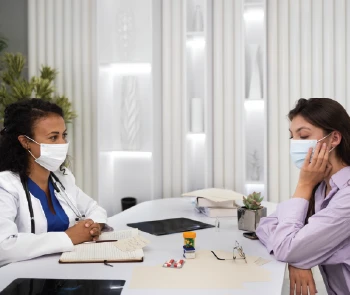
World Cancer Day, observed annually on February 4th, aims to raise awareness about cancer and encourage its prevention, detection, and treatment. Among the various advancements in cancer care, genetic counseling stands out as an essential service for individuals at risk of hereditary cancers. It empowers patients and families with vital knowledge to make informed decisions regarding their health. In cancer genetics, both pre- and post test counseling play significant roles in providing tailored care, improving outcomes, and reducing the overall cancer burden.
Understanding Genetic Counseling
Genetic counseling involves the process of evaluating an individual’s or family’s genetic risk for inherited conditions, including cancer. It provides the guidance needed to understand genetic testing results, implications for family members, and available preventive options. Genetic counselors work alongside oncologists, geneticists, and other healthcare providers to assess personal and family medical histories and determine if further genetic testing is required.
In cancer genetics, the goal of counseling is to understand the hereditary patterns that may increase the risk of certain types of cancer, such as breast, ovarian, colorectal, and prostate cancers. This helps identify individuals at high risk of developing cancer and provides them with strategies for early detection and prevention.
Pre-test Genetic Counseling: Prevention and Early Detection
Pre-test genetic counseling typically occurs before a test, and its importance lies in identifying individuals at high genetic risk. Many cancers, such as those linked to mutations in BRCA1 and BRCA2 genes, run in families, which means the risk of developing cancer can be inherited. Genetic counseling helps people understand their likelihood of inheriting such mutations, based on their family history or known hereditary cancer syndromes.
- Early Detection: One of the key benefits of pre-test genetic counseling is the potential for early detection. For individuals at high risk due to genetic mutations, regular screenings (such as mammograms, colonoscopies, and MRI scans) can help catch cancers at their earliest, most treatable stages.
- Personalized Prevention Strategies: Counselors discuss and suggest personalized prevention options, which could include lifestyle modifications, increased surveillance, or preventive surgeries (such as mastectomies or oophorectomies in certain high-risk individuals). These steps can dramatically reduce the risk of cancer developing, giving individuals better control over their health outcomes.
- Psychological Support: The emotional burden of knowing one may carry a genetic mutation that increases cancer risk can be overwhelming. Genetic counselors provide essential psychological support, helping individuals navigate the emotional aspects of potential cancer risk and making informed decisions.
- Informed Family Planning: Pre-test counseling can also play a role in family planning. Families can discuss reproductive options, including genetic testing for embryos or potential adoption, to mitigate the risk of passing on certain genetic mutations.
Post-test Genetic Counseling: Understanding Implications for Treatment and Family
Post-test genetic counseling occurs after the test and is vital for both the individual and their family members. Once a person has been diagnosed with cancer, understanding the genetic factors that contributed to the disease becomes crucial in shaping treatment plans, assessing risks for future cancers, and offering family members insights into their own potential genetic risks.
- Tailored Treatment Plans: Many cancer treatments today are tailored to genetic profiles, including targeted therapies and immunotherapies. For example, knowing the genetic makeup of a tumor can lead to precision medicine, where drugs are selected based on the specific mutations driving the cancer. Understanding the genetic mutations within the tumor can thus help oncologists provide a more effective, personalized treatment approach.
- Identifying Family Risk: After a cancer diagnosis and genetic testing, post-test counseling is also critical for identifying whether the individual’s family members are at risk. Genetic counselors can explain whether the cancer is hereditary, and if so, other relatives may be encouraged to undergo testing or early screenings.
- Cancer Recurrence Risk: For individuals who have been treated for cancer, post-test genetic counseling can assess the risk of recurrence based on their genetic profile. This helps guide long-term surveillance plans, such as regular check-ups or specific tests to monitor for any signs of cancer recurrence.
- Reducing Emotional Impact: Receiving a cancer diagnosis with genetic variation can cause emotional turmoil, and genetic counseling helps individuals understand how their genetic profile influences their condition. This understanding can provide emotional relief, as patients are given a sense of control over their future and treatment decisions.
The Global Impact of Genetic Counseling
Genetic counseling in cancer genetics can save lives by providing the knowledge and tools necessary to prevent, detect, and treat cancer in individuals and their families. In many parts of the world, awareness and access to genetic counseling are still limited. Yet, as technology and healthcare accessibility improve, we can envision a future where more individuals around the globe can benefit from these services, leading to a significant reduction in cancer cases and fatalities.
On World Cancer Day, we must advocate for greater awareness and accessibility of genetic counseling, emphasizing its role in transforming cancer prevention and treatment. By increasing awareness of the importance of genetic counseling, we not only enhance the lives of individuals at risk but also contribute to a collective effort to reduce cancer-related deaths worldwide.
Conclusion
Genetic counseling, both pre- and post-test, is an invaluable resource that offers critical insights into cancer risk, prevention, and treatment. As we observe World Cancer Day, it is essential to recognize the transformative impact of genetic counseling in cancer care. By increasing awareness, promoting access, and providing individuals with the knowledge they need to make informed decisions, we can take a giant step toward a future where cancer is better understood, prevented, and treated with greater precision.
The journey to reducing the global cancer burden starts with education, early detection, and personalized care—principles that genetic counseling brings to the forefront of cancer prevention and care.
